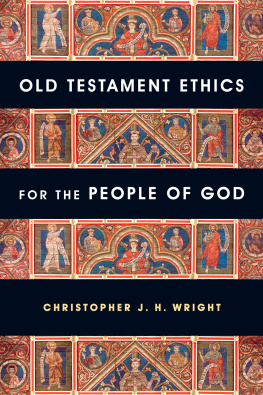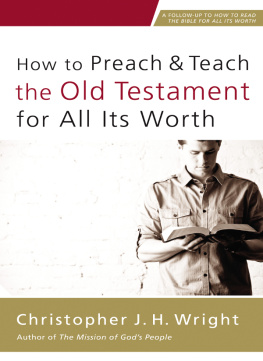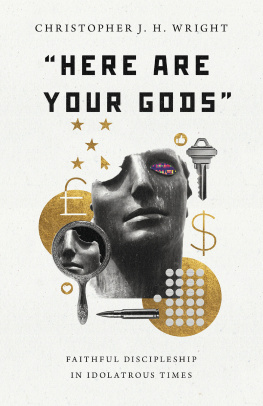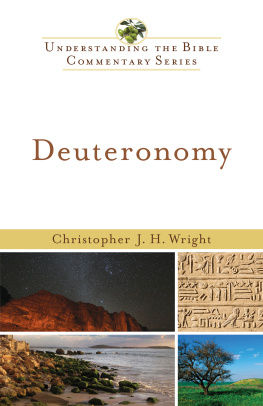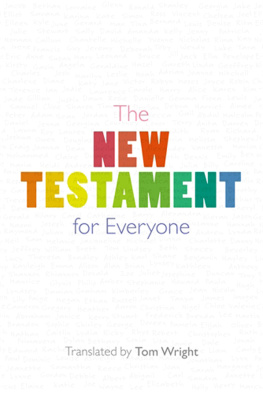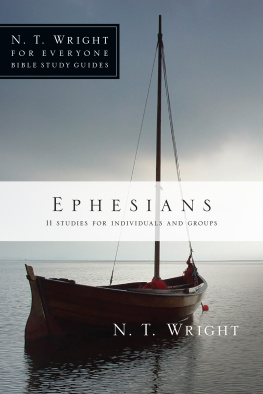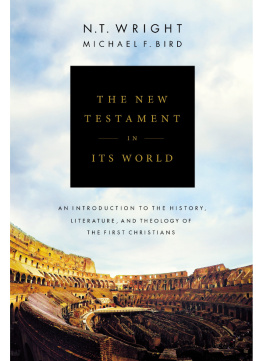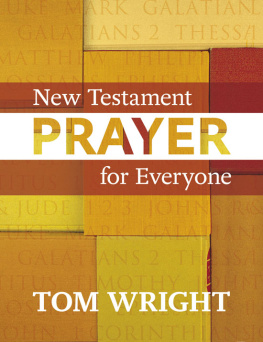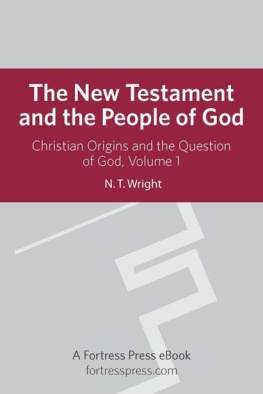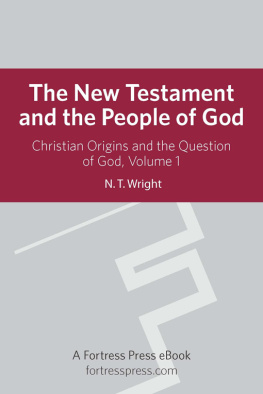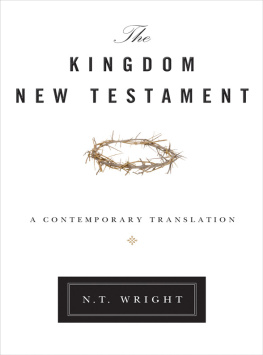All the royalties from this book have been irrevocably assigned to Langham Literature (formerly the Evangelical Literature Trust), a programme of the Langham Partnership International (LPI). Langham Literature distributes evangelical books to pastors, theological students and seminary libraries in the Majority World, and facilitates the writing and publishing of Christian literature in regional languages.
For further information on Langham Literature, and the other programmes of LPI, visit the website at .
In the USA John Stott Ministries is the national member of the Langham Partnership International. All enquiries may be made through .
OLD TESTAMENT ETHICS
FOR THE PEOPLE OF GOD
CHRISTOPHER J. H. WRIGHT
InterVarsity Press
P.O. Box 1400, Downers Grove, IL 60515-1426
Internet: www.ivpress.com
E-mail:
Christopher J. H. Wright, 2004
Published in the United States of America by InterVarsity Press, Downers Grove, Illinois, with permission from Inter-Varsity Press, Leicester, U.K. All rights reserved. No part of this book may be reproduced in any form without written permission from InterVarsity Press.
InterVarsity Press is the book-publishing division of InterVarsity Christian Fellowship/USA , a student movement active on campus at hundreds of universities, colleges and schools of nursing in the United States of America, and a member movement of the International Fellowship of Evangelical Students. For information about local and regional activities, write Public Relations Dept., InterVarsity Christian Fellowship/USA, 6400 Schroeder Rd., P.O. Box 7895, Madison, WI 53707-7895, or visit the IVCF website at .
All Scripture quotations, unless otherwise indicated, are taken from the Holy Bible, New International Version. NIV. Copyright 1973, 1978, 1984 by International Bible Society. Used by permission of Hodder and Stoughton Ltd. All rights reserved. NIV is a registered trademark of International Bible Society. UK trademark number 1448790. Distributed in North America by permission of Zondervan Publishing House.
Incorporates material first published in Living as the People of God (IVP, 1983) and Walking in the Ways of the Lord (Apollos, 1991). Fully revised and updated for this volume.
Cover design: Cindy Kiple
Image: Central panels depicting three kings, Ezekiel, Solomon and David, German School at Church of St. Michael, Hildesheim, Germany / Hirmer Fotoarchiv / The Bridgeman Art Library.
ISBN 978-0-8308-6494-2 (digital)
ISBN 978-0-8308-3961-2 (print)
This digital document has been produced by Nord Compo.
To Liz
Catharine and Andy
Tim and Bianca
Jonny and Emma and Helena
and Suzy
PREFACE TO LIVING AS THE PEOPLE OF GOD
Some authors preface their works with an apology or justication for adding another volume to the literature on their subject. At least I feel I am spared that duty since the subject of Old Testament ethics has scarcely any literature to add to. There are many academic articles and special studies, of course, that bear on the ethical signicance of the Old Testament, as the bibliographies show. But I am not aware of any recent attempt to present an overview of the subject as a whole. So, without pretending to have exhausted the subject in depth or detail, I have attempted to provide a comprehensive framework within which Old Testament ethics can be organized and understood. The student should nd in the bibliographies sufficient resources to take his study to deeper and wider dimensions.
In the interests of the general reader I have avoided as far as possible the use of technical vocabulary and dense footnotes. The only technical term I have consciously allowed myself is paradigm and its derivative, paradigmatic. I can nd no simpler word to express the points I wish to make concerning a method of understanding and applying the Old Testament. The term is fully dened and explained as soon as it rears its head in chapter 2. Likewise, one or two other more familiar items of theological vocabulary are explained as they arise.
Two other points need to be made. First, a glance at the table of contents will show that most of the material is concerned with social aspects of the ethics of the Old Testament. Only in the last chapter do we look at personal or individual ethics. This may be somewhat unbalanced, since undoubtedly a lot more could be said on the personal ethical demands to be found in the Old Testament. The emphasis is, nevertheless, quite deliberate, and based on the conviction that the primary ethical thrust of the Old Testament is in fact social. The Old Testament is the story of a people Gods people; and all the morally memorable tales of individuals are part of that wider story. God called a whole society to be a people for his own possession, to live before him in the midst of the nations of the earth. So, as the title indicates, the Old Testament is absorbed with what it means to be the living people of the living God.
The second point relates to the subtitle and the chapters in Part Two. I am convinced that the Old Testament, when properly understood and applied as part of the whole canon of Scripture, has a vital relevance for the whole range of our ethical concerns. My aim in this book is to point out ways in which it can be validly applied, to suggest directions for such applications, rather than to follow those directions through to detailed conclusions in each sphere. I am not an economist, nor a politician, lawyer or sociologist, and claim no special expertise in these areas. But my hope is that Christians who do work in these and other elds will be stimulated by what is offered here to a more coherent and effective application of biblical theology and ethics to the particulars of their own environment.
Many of the ideas of this book were rst aired and shared in the congenially critical context of various study groups of the Shaftesbury Project. I am most grateful to the members of those groups for their stimulus over the past years, and also to the Shaftesbury Project itself for permission to modify and revise material they originally published as working papers.
I also wish to record my gratitude to the kind ladies of Tonbridge who typed the manuscript: Sheila Armstrong, Sue Bladon, Kathie Portlock and Frances Weller. My thanks also go to Brian and Megan Adams, Kenneth and Margaret Gubbins, Lawrence and Margaret Pope and David and Clare Wenham, who provided hospitality of various kinds for me during the writing of the book. I greatly appreciated the careful scrutiny of the Revd David Field and Dr Gordon Wenham who read the original typescript and made a large number of very helpful comments. Their suggestions helped me to clarify or improve what I wanted to say at a number of points. The book owes its indexes to the labours of some of my students at All Nations.
Only an authors family shares the full burden of the writing of a book, but my own family has gone beyond such patient forbearance and has turned some of the warmer principles of Old Testament ethics into a living experience of great joy. So with gratitude and affection this book is dedicated to them all.
Christopher J. H. Wright
PREFACE
When Living as the People of God came out in 1983, the level of interest (academic or popular) in Old Testament ethics was so low that few people (least of all the author) would have been bold enough to anticipate the book surviving two decades and re-emerging in a revised edition. There had been a long dearth of ethical engagement with the Old Testament. Cyril Rodd tells us that in 1956 he was discouraged from any interest in the subject of Old Testament ethics on the ground that there was no future in it. In 1970 I wrote to my former undergraduate theology supervisor at Cambridge, John Sturdy, to ask if Old Testament ethics would be a good topic for doctoral research. He replied that it could well be, since nobody had written anything on it in English for fty years. In 1973 when I was struggling to gain some leverage on how to tackle a dissertation on the subject, a distinguished German professor told me he was not surprised at my difficulties, since the subject doesnt exist a comment that did little to fortify my resolve in researching it.

